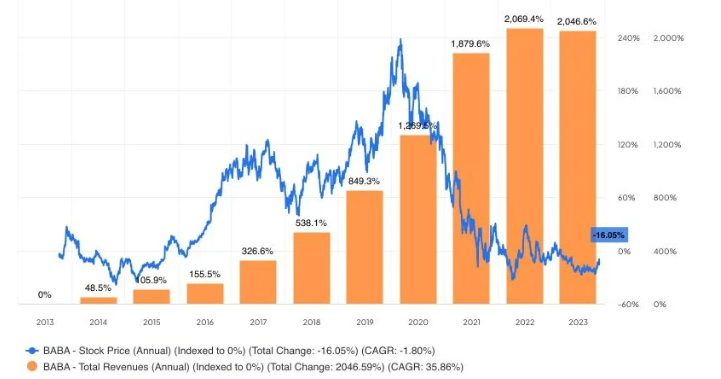Introduction
Alibaba Group Holding Limited (NYSE: BABA) has long been regarded as a cornerstone of e-commerce in China and a significant player in the global market. As we approach 2025, investors are evaluating whether Alibaba stock is a worthy addition to their portfolios. With fluctuating market conditions, shifts in consumer behavior, and emerging technological advancements, it’s crucial to explore the various factors that make Alibaba an appealing investment. Moreover, the company offers numerous avenues for generating passive income, appealing to entrepreneurs and investors alike. This article will delve deeply into the investment potential of Alibaba stock and the diverse strategies for making passive income with its ecosystem.
The Current Market Landscape
The investment landscape for Chinese stocks has seen significant changes recently. Following regulatory crackdowns and economic uncertainty, many investors have been cautious about investing in Chinese markets. However, recent trends indicate a resurgence in Chinese and Chinese-concept stocks, raising optimism among analysts. Alibaba, in particular, has shown resilience, making it a focal point for potential investment in 2024.
Alibaba Stock: Analyzing Investment Potential
1. Stock Performance and Analysts’ Insights
According to Stock Analysis, the average target price for Alibaba (BABA) stock is $107.15, with a range between $85.00 and $135.00. Analysts anticipate a remarkable 39.99% gain by the end of 2024, underscoring the stock’s potential for appreciation. The consensus among financial analysts is a ‘Strong Buy,’ indicating confidence in the company’s future prospects.
Understanding these metrics is crucial for any investor. The target prices are derived from various analyses that take into account the company’s financial health, market conditions, and competitive landscape. For example, analysts consider Alibaba’s revenue growth, profitability margins, and market share when projecting future stock performance.

2. Financial Health of Alibaba
A critical component of any investment decision is the financial health of the company. Alibaba has a diversified revenue stream that includes:
- E-commerce: Alibaba operates several platforms, including Taobao and Tmall, which cater to millions of consumers in China and abroad. The scale and reach of these platforms provide a solid foundation for revenue generation.
- Cloud Computing: Alibaba Cloud is a leading cloud service provider in Asia, catering to businesses that require robust cloud infrastructure. The demand for cloud services has surged, especially post-pandemic, as more companies transition to digital operations.
- Logistics and Delivery: Through its subsidiary Cainiao, Alibaba is invested in logistics and delivery services, enhancing its e-commerce capabilities and providing faster service to consumers.
An examination of Alibaba’s financial statements reveals strong revenue growth, a healthy balance sheet, and significant cash reserves, all of which contribute to its attractiveness as an investment.
3. Market Position and Competitive Advantages
Alibaba’s dominant position in the Chinese market is bolstered by several competitive advantages:
- Brand Recognition: As one of the first movers in the Chinese e-commerce space, Alibaba has built a reputable brand that consumers trust.
- Technological Innovation: The company continually invests in technology to enhance user experience, from AI-driven recommendations to advanced payment systems.
- Ecosystem Synergy: Alibaba operates a vast ecosystem that includes e-commerce, cloud computing, digital payments (Alipay), and logistics. This integrated model provides a seamless experience for users and creates multiple revenue streams.
Exploring Passive Income Opportunities with Alibaba
If you’re looking to capitalize on Alibaba’s potential beyond just buying stock, several passive income strategies can be leveraged within its ecosystem. Let’s explore these in detail:
1. Dropshipping
Overview of Dropshipping
Dropshipping is a retail fulfillment model that allows you to sell products without holding inventory. Instead, when a customer makes a purchase, you buy the item from a supplier (often found on platforms like Alibaba or AliExpress) and have it shipped directly to the customer.
Steps to Start a Dropshipping Business
- Choose a Niche: Identify a product category that interests you and has market demand. Use tools like Google Trends or market research to validate your niche.
- Select a Platform: Platforms like Shopify, WooCommerce, and Etsy allow you to set up an online store easily. Each platform has its pros and cons, so choose one that fits your needs.
- Find Suppliers: Use Alibaba or AliExpress to find reliable suppliers. Review their ratings, read customer reviews, and communicate with them to ensure they meet your standards.
- Set Up Your Store: Design your online store, ensuring it’s user-friendly and visually appealing. Add product descriptions, high-quality images, and pricing details.
- Market Your Store: Utilize social media marketing, SEO, and paid advertising to drive traffic to your store. Engaging content and targeted ads can help attract potential customers.
- Process Orders: When you receive an order, forward the details to the supplier and have them ship the product directly to the customer. Your profit comes from the markup on the wholesale price.

Benefits of Dropshipping
- Low Initial Investment: You don’t need to buy inventory upfront, allowing you to start with minimal capital.
- No Inventory Management: You won’t have to worry about storage or unsold inventory, as the supplier handles that.
- Location Independence: Operate your business from anywhere, making it suitable for digital nomads or those looking for flexibility.
- Scalability: Easily add new products to your store without the need for additional inventory.
- Reduced Risk: Purchase products only after they’ve been sold, minimizing the risk of financial loss from unsold items.
Challenges of Dropshipping
While dropshipping offers many advantages, there are challenges to consider:
- Competition: The low barrier to entry means high competition in popular niches.
- Supplier Reliability: Choosing reliable suppliers is crucial; poor-quality products or slow shipping can harm your reputation.
- Customer Service: As the retailer, you’re responsible for handling customer service issues, which can be time-consuming.
2. Investing in Alibaba Stock
For those who prefer a more traditional investment approach, buying Alibaba stock remains an option. Here’s a deeper look at this strategy.
Understanding Stock Investments
Investing in stocks involves purchasing shares of a company with the expectation that their value will increase over time. By buying Alibaba stock on etoro or sofi etc, you become a partial owner of the company, sharing in its profits and losses.
Key Considerations for Investing in Alibaba
- Research: Conduct thorough research to understand the company’s financials, market trends, and competitive positioning. Utilize resources such as financial news, stock analysis platforms, and company reports.
- Risk Management: Investing in stocks carries inherent risks. Be prepared for market volatility, and consider diversifying your portfolio to mitigate risk.
- Long-Term Perspective: While short-term trading can be tempting, a long-term investment strategy often yields better returns. Alibaba’s growth potential in e-commerce and cloud computing suggests a promising outlook over the long term.
3. Affiliate Marketing
Overview of Affiliate Marketing
Affiliate marketing is a performance-based model where you earn commissions by promoting products or services. When users click on your affiliate links and make purchases, you receive a commission from the sale.
Getting Started with Affiliate Marketing
- Create a Website: Building a website is crucial for affiliate marketing. Platforms like WordPress make it easy to create a professional site without technical expertise even if you are totally new to coding or designing.
- Join Affiliate Programs: Apply for Alibaba or AliExpress affiliate programs. You can also join affiliate networks like ShareASale and Admitad, which connect you with various merchants.
- Generate Content: Create engaging content that resonates with your target audience. This can include product reviews, blog posts, and social media content that promotes Alibaba products.
- Promote Your Links: Use SEO, social media, and email marketing to drive traffic to your affiliate links. The more visitors you attract, the higher your potential commissions.

Benefits of Affiliate Marketing
- Passive Income: Once your content is published and traffic starts flowing, you can earn commissions without actively selling products.
- Low Start-Up Costs: Affiliate marketing requires minimal investment, making it accessible to anyone.
- Flexibility: You can work from anywhere and set your own schedule, making it ideal for those seeking a flexible income source.
Challenges of Affiliate Marketing
- Building Traffic: Attracting visitors to your website takes time and effort, requiring consistent content creation and marketing strategies.
- Commission Variability: Your income can fluctuate based on traffic levels and market trends, making it less predictable than a traditional job.
Conclusion
As we approach 2025, Alibaba remains a powerful player in the e-commerce and cloud computing landscapes. With strong financial health, a diverse range of revenue streams, and a favorable market outlook, investing in Alibaba stock could be a wise decision for those seeking growth.
Moreover, the company offers multiple avenues for generating passive income, whether through dropshipping, stock investments, or affiliate marketing. Each strategy has its own set of advantages and challenges, making it essential to choose the one that aligns with your skills, interests, and risk tolerance.
Ultimately, thorough research and a strategic approach will be crucial in navigating Alibaba’s offerings and determining the best way to capitalize on its growth potential in 2024 and beyond. Whether you’re an investor or an entrepreneur, Alibaba’s ecosystem presents a wealth of opportunities waiting to be explored.


